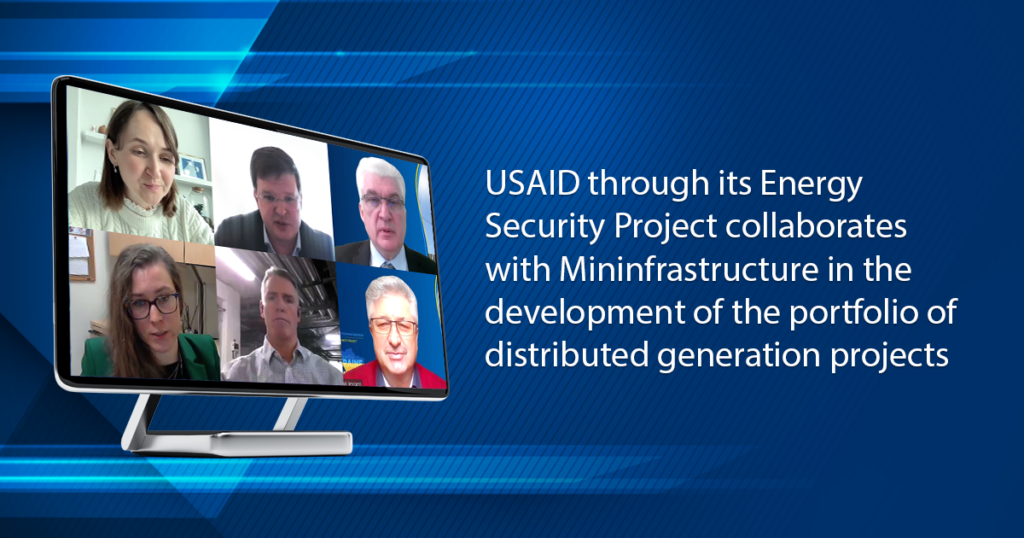
The USAID Energy Security Project (ESP) and the Ministry of Communities, Territories and Infrastructure Development of Ukraine (Mininfrastructure) held a coordination meeting with the regional administrations, heat and electricity supply companies and discussed practical steps for the development of the distributed generation projects to enhance the resilience of Ukraine’s energy infrastructure. This collaboration is part of implementing the activities under the Memorandum of Understanding between USAID ESP and the Mininfrastructute, signed in November 2023.
The parties discussed the issue of supporting Ukraine’s transition to a low-carbon, competitive, and EU-integrated energy economy.
Oleksandra AZARKHINA, Deputy Minister of Communities, Territories and Infrastructure Development of Ukraine: “The collaboration between USAID ESP and the Ministry of Infrastructure is a strategic initiative aimed at finding the most effective solutions for the restoration, reform, and development of energy and municipal infrastructure within communities. We are grateful for the assistance provided by our international partners in this endeavor,” she stated. According to her, the primary task today is to ensure the energy resilience of communities, including the development of distributed energy generation with integrated cogeneration, the utilization of renewable energy sources and biofuels, as well as the modernization of district heating, including through private investment participation.
Distributed generation, which includes cogeneration and alternative fuel sources, offers a way to ensure continuous heat supply during blackouts. This approach also makes it possible to generate electricity in insolated mode and it serves as a vital energy resource for local critical infrastructure like water supply, sewage systems, and hospitals.
“USAID has consistently supported Ukraine in defending and restoring critical energy infrastructure. Essential equipment provided by USAID, such as generators, transformers, mobile and stationary boiler houses, and cogeneration units, is already in use, ensuring a reliable supply of electricity and heat,” said Kathleen Kirsh, Energy Team Lead of the Office of Critical Infrastructure of USAID/Ukraine. She mentioned that USAID has already taken initial steps to support the resilience of critical infrastructures and now works with the Mininfrastructu to help develop distributed generation projects in communities.
To date, USAID ESP has been providing technical assistance to the Ministry of Infrastructure, including the development of a draft Law on Individual Heating Substations, Heat Supply Schemes, Concepts for State Support of District Heating Companies and thermo-modernization, Regulatory-Asset-Based (RAB) tariff-setting methodology, the vast variety of training to strengthen the institutional capacity of state bodies, municipalities, and energy sector companies.
The recently signed Memorandum of Understanding between USAID ESP and the Ministry of Infrastructure is expanding the areas of cooperation, including the development of flexible, resilient, and sustainable energy supply systems through the introduction of distributed generation and preparation of project prefeasibility studies to attract investments for project implementation. “The distributed generation concept can prove to be one of the solutions to increase Ukraine’s resiliency in terms of uninterruptable heat and electricity supply to critical infrastructure, especially during electricity blackouts,” said Michael Trainor, the USAID ESP Chief of Party.
During the coordination meeting, USAID ESP presented the project implementation roadmap and outlined the expected results, such as a developed portfolio of investment projects attractive for financing, increased security and resilience of critical infrastructure in Ukrainian communities, minimized regulatory barriers to the development of distributed energy generation, and increased public and professional awareness of energy sector reforms needed to support investment in distributed generation at the municipal level.
